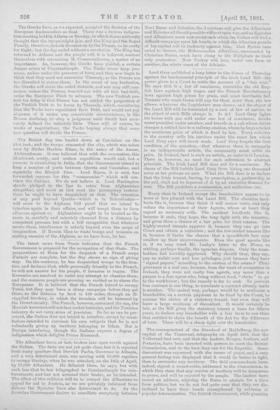Lord Grey published a long letter in the Times of
Thursday against the fundamental principle of the Irish Land Bill—the power given to a Court to settle the amount of a "fair rent." He says this is a law of maximum, resembles the old Eng- lish laws against high wages and the French Revolutionary laws against high prices for grain, and must inevitably fail. Tenants who want farms will pay for them more than the law allows, whatever the Legislature may decree, and the object of the Laud Bill will be frustrated by a sort of law of nature, as the object of such Bills always is. Is it ? Lord Grey lights his house with gas sold under one law of maximum, drinks water provided under another, and travels in a cab whose driver charges a settled fare to a railway-station, where he buys a ticket the maximum price of which is fixed by law. Every solicitor in the country sells- his services under the exact law which Lord. Grey says will never work. Lord Grey forgets the first condition of the question,—that wherever there is monopoly in an indispensable article, the community must settle its price. In Ireland, laud is such au article, as water is in Loudon. There is, however, no need for such references to abstract principle. The Irish Land Bill does not fix a maximum. No clause of the Bill forbids Lord Grey from hiring one thousand acres at ten guineas an acre. What the Bill does is to declare that the Irish tenant, having, by prescription, a partnership in the soil, shall not be deprived of it by an excessive demand for rent. The Bill prohibits a confiscation, not authorises one.


































 Previous page
Previous page